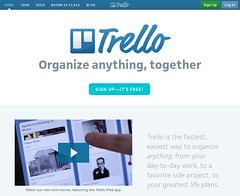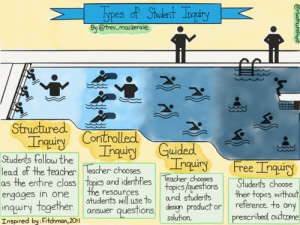
“Trello” by Brian Dys is licensed under CC BY-NC-ND 2.0
What a week! I was able to dream and make connections to my upcoming Environmental Science class that left me inspired and invigorated. Two leaders in the field of inquiry and personalized learning visited our class this week. Trevor Mackenzie came to speak with us about Inquiry and Project Based Learning, and Jeff Hopkins shared some of his experiences as an educational leader at the Pacific School of Innovation and Inquiry(PSII) in downtown Victoria. The work of both of these speakers reminded me of the film “Most Likely to Succeed” by Ted Dintersmith that introduces viewers to High Tech High in San Diego. The founding principles of High Tech High are equity, personalization, authentic work and collaborative design. These principles are evident throughout Trevor MacKenzie’s book Dive into Inquiry, in the design of the PSII, and also in the new BC curriculum.
The new BC curriculum aims to achieve curriculum competencies by equipping learners with the core competencies of
- Communication
- Creative and Critical Thinking
- Personal and Social Awareness and Responsibility.
The core competencies and revised curriculum allow teachers and learners to dive deeper than knowledge acquisition and retention so they can apply their skills in exciting new ways. I am reminded of the visual from Trevor MacKenzie’s book Dive Into Inquiry:

The goal for the teacher is to facilitate students progression from structured inquiry through to free inquiry. There are real challenges in introducing guided and free inquiry in the context of our current public school system. A few such challenges include the physical structure of our schools, schedules, assessment practices, class sizes and teaching students according to grade and course subject. Jeff was able to design an independent school that addresses these limitations, however, I am hopeful that I can provide similar meaningful learning experience in the current public school system.
I will be teaching Environmental Science 11 for the first time in the fall of 2020. I have a variety of goals for this class, but in this blog I want to focus primarily on promoting inquiry and personalized learning in the wake of this weeks EDCI 568 lessons.
Early Learning Models as an Educational Foundation
Jeff strongly recommended that all educators familiarize themselves with early learning practices. British Columbia’s Early Learning Framework is currently being updated to respond to the challenges and possibilities of the 21st century, just as our K-12 curriculum has been. The pages of the draft framework mirror many of the curriculum competencies, however the role of play and emergent learning is prominent in the early learning framework. Specifically, the StrongStart BC resource emphasizes the importance of play-based learning environments that foster discovery and creativity. In his visit to our class Jeff spoke of being disappointed with his high school experience even though the opportunities seemed endless with great teachers and plenty of resources. Perhaps it was the absence of emergent learning, or the ability to follow one’s own interests in order to create and solve one’s own questions that limited his engagement.
Inquiry-Based Learning
At PSII they help facilitate emergent learning with inquiry learning tools found on the Human Learning Institute site which includes
- Inquiry Guide
- Inquiry Process Flowchart
- Competency Assessment Framework
Before educators ‘Dive into Inquiry‘, it is important to acknowledge that many students approach inquiry with uncertainty and trepidation as the freedom to guide their own learning is unfamiliar. Jeff mentioned the following questions were useful when helping students ‘unlearn’ the traditional school structure and embark on learning based on inquiry and innovation:
- What do you know?
- What are you interested in?
- What would you be doing if you weren’t here?
- What do you learn when your doing that?
Jeff also mentioned that when students participate in inquiry based learning, there is a prerequisite that the teacher let go of a certain element of control. The new role of the teacher is not to control the information that the learner is introduced to, but to facilitate the discovery of that information. Often that includes leaving the confines of the school, and this is an experience I hope to offer my Environmental Science students next year.
Opportunities for Collaboration
Resources in our community for environmental education abound, and by engaging in partnerships with community members my students can experience positive collaborative interactions that will enhance relational skills that are paramount in so many 21st century jobs. I have lined up almost a dozen local experts in environmental restoration that will share with students some of the projects already underway in our community. To my delight many of these community members are not only willing but excited at the opportunity to mentor high school students and influence a future generation of environmental stewards. Students will pose inquiry questions that will guide their own exploration from questioning to learning activities and projects that have a positive impact on our local environment. This leads us to the next important stage of inquiry and project based learning: Assessment.
Assessment
How will I capture the moments of learning through this inquiry process and collaborative community engagements? I really appreciated the personal approach that Jeff outlined with regards to assessment and the continuum of engagement with the learning. Scheduling weekly discussions with students to discuss goals, progress, and challenges will be an imperative tool to monitor and facilitate positive learning experiences. This will be complemented by the use of Trello, a tool for organizing and prioritizing tasks and projects. As students will be working in small groups, I am intrigued by the idea of Agile Scrum meetings, which can be conducted daily or weekly to encourage student independence and organization. Quick Scrum meetings can be used to review what has been completed, what the tasks for the day or week are, and what obstacles need to be overcome to continue working. Additional resources for Scrum meetings include
- A Quick Guide to Scrum Meetings
- Scrum Presentation by Mountain Goat Software
- Scrum in the Classroom (Part1) / Time for Change: Blog post by Joe Krebs
- Intro to Scrum in Under 10 Minutes:
The final evidence for learning will be determined through conversations conducted throughout project development. The expectation and requirement to provide evidence of the acquisition of relevant knowledge and skills seems like a much more authentic means of assessment than traditional testing. Referring to the above noted Competency Assessment Framework used by PSII will be a valuable tool in constructing competency-based assessment in the following areas:
- Ecological Literacy
- Critical and Creative Thinking
- Personal Planning and Responsibility
- Information and Media Literacy
- Cultural Awareness and Understanding
- Collaboration and Leadership
- Reading, Writing, Speaking and Listening
Predicted Challenges for Implementing Inquiry and Personalized Learning
During Jeff’s visit to our class, it became clear that two of the greatest challenges I will face implementing inquiry-based learning will be class size and the restrictive school schedule. I will have a class of 28 students that will have limited experience in self-directed learning. It will be crucial to develop strong relationships with my students, and encourage a team dynamic in the classroom. I can also overcome some of the challenges of a large class size by
- working in small groups
- modeling and encouraging regular scrum meetings
- using Trello to facilitate student organization and teacher-student communication
The obstacle of our existing school schedule will be a little more challenging to navigate. My vision of a successful experience for my students will be one where they are excited and able to meet with their community mentor during class time (or certainly outside of school if they would like). This level of student autonomy rarely exists within our public school framework. If this vision is to become a reality it will require
- Parental involvement (and permission for excused absences)
- engaged and invested students
- a clear plan for daily and weekly progress with a focus on providing evidence of learning
- strong trusting relationships
There are many more details to be considered in the development of my course, but I am confident that with the resources and literature provided by experts in the field, such as Jeff Hopkins and Trevor Mackenzie, I can overcome existing obstacles and participate in enjoyable and meaningful learning experiences with my students. Stay tuned!
Trevor MacKenzie on twitter: @trev_mackenzie
Jeff Hopkins on twitter: @hopkinsjeff
Other interesting school designs and ecological learning opportunities can be found at
- Seec – Saturna Ecological Education Centre: http://seecsaturna.ca/
- O.U.R. Ecovillage https://ourecovillage.org
- Imaginative Ecological Education offered through the Centre for Imaginative Education at SFU